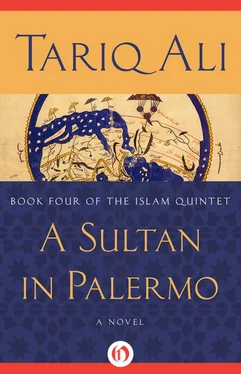Idrisi was preoccupied with more intimate problems — unsurprising since he lived with them each day. Mayya and Balkis were seven and six months pregnant, their distended stomachs competing for his attention. He spent more time with Balkis than with Mayya and for a simple reason: Balkis was locked inside him. When questioned by Elinore about the apparent discrepancy in his affections, he assumed the air of a physician. ‘Your mother has had you and knows what is involved. For Balkis it is her first child and the circumstances are difficult. She needs more care.’
Elinore raised her eyes and glared at him, but no words were exchanged.
Balkis had written to her husband Aziz and informed him of her state. A special messenger had arrived within three days to deliver a letter in return. He was delighted and would leave Siracusa in a few weeks to fetch her. He pleaded with her not to exert herself too much or do anything that could threaten the child. The news came as a relief to Mayya, but cast a thick cloud of gloom around the guest chambers occupied by her sister. For most of the time the sisters displayed a stoicism that greatly impressed Idrisi. What he did not realise was that what usually brought them close to each other was his absences from the house. If he had decided on a long sea journey the sisters would have become inseparable. These days he would not leave the island.
A week or two in Shakka or Djirdjent was the farthest he travelled to meet old friends and also to continue his research on herbal cures for the medical formulary he was composing. Nor were the two women exempted from his experiments. He inspected them closely and noted how their bodies reacted to the presence of the unborn child. Mayya could no longer eat meat and her body rejected all sweet delicacies except pastries that contained only honey. Balkis became allergic to garlic and onions, but developed a huge appetite for a long, thin pastry filled with almond paste. Neither of them could bear to taste the Arabian coffee which had been a household favourite.
Once, when Idrisi had developed a cough which persisted, he tried his own cure of honey, ginger and wild thyme boiled in water and, despite the unpleasant taste, he took it thrice a day. It had always worked before, but this time the cough refused to go away. In order to avoid infecting the two women he had stayed away from them, concentrating on writing and playing chess with Elinore.
One afternoon Balkis, who missed his presence more than her sister, entered his chamber and cradled his head on her breasts. The cloth covering her was moist with her milk. He licked it and liked the taste, then lifted her dress, eager for more. That same night his cough disappeared. It could have been pure coincidence, but Idrisi linked it to the milk. Was this real or a hallucination? He decided it was real. Was it the combination of honey, herbs and human milk that had worked the cure, or the milk alone? And if it was the milk alone, could he include the prescription in his formulary? He dreaded the thought of cough-ridden Sultans, Emirs and Barons scouring their palaces and estates for women in late pregnancy. It would add another burden on the poor. On the other hand, if he did not record the cure he would be in breach of the ancient oath. He arrived at a compromise with himself. Both women were likely to be breast-feeding the infants for a year or possibly two. It was just as likely that he would develop a cough over this period. When there was a conjunction between the two events he would just drink the milk. If the cough disappeared he would have to mention the fact in the formulary, regardless of the consequences. If it did not work, then he could regard what had happened with Balkis’s milk as a chance occurrence. But clearly Balkis had other concerns on her mind. From the look on her face he knew this was to do with her husband. She stood there, arms on hips and gave him one of her fierce looks.
‘Balkis, you must go with him, at least till the child is born. Afterwards he will not object if you return.’
‘You don’t care for me now that I am fat and ugly,’ she screamed, hurling herself against his body and weeping.
‘I agree that your body is not at its best, but to suggest that the love I feel for you is dependent on such things is an insult to our passion. If what you say were true, how do you explain that we make love almost every day, ignoring your stomach which seeks to obstruct us? Do you think I’m pretending when we are at the height of our union?’
‘Then why do you say I must go?’
‘It’s because you are married to him, Balkis. How often have we discussed this possibility? Believe me, all he wants is to show his child to his people and his family. I hope, for his sake, it is a boy. That will make him very happy. He won’t mind your returning here to create another child.’
She laughed. ‘In that case you should pray it’s a girl. Then I will definitely be returned to the great physician. But you speak the truth. I know that and I will do as you ask. The one thing I cannot bear to think of is being touched by him and if he does…’
‘Most men stay away from women when they are breast-feeding an infant. The reason I would not is because as a physician it is my duty to observe and record the functions…’
She kissed his lips and might have moved further had Ibn Fityan not knocked on the door to inform them that the Amir of Siracusa had left the palace and was reported to be riding in the direction of the house.
Refreshments, including the exquisite lemon elixir, were served on the terrace where they could enjoy the warmth of the winter sun. Aziz described his visit to the Sultan. He had been questioned in detail about the Trusted One, but denied that a Bishop had been burnt or Lombards fed to the animals.
‘But I can tell you, dear friends and trusted wife, what really took place. It is quite remarkable, but disturbing. They did burn the Bishop and the Trusted One did shout it was for Philip, but they dug a grave for the prelate and the local monk swears on the bible that he died a natural death. After his death the Lombards fought each other for the Bishop’s gold and probably his store of young men and, to the amazement of all, they destroyed first the castle in search of the gold and later themselves. The single survivor died of wounds. They were all buried in consecrated ground. This is, incidentally, true.’
‘But how did the battle start?’
Aziz told them the entire story, except what he did not know, namely, the meeting between the Trusted One and Halima and the discovery of his real identity.
‘We tended to believe that the Trusted One was a slightly unbalanced preacher, wandering through villages and infecting the credulous peasants with religious dreams, encouraging martyrdom and revealing the stigmata that marked his own uncultivated mind. This was certainly the impression he wanted to convey. But what he has done threatens us all.’
‘How?’ inquired Mayya, her curiosity aroused.
‘Shame has disappeared in that village. The people look into your eyes when they speak. Pride and insolence have replaced respect for their betters. One peasant had the effrontery to ask if I had read Aristotle. The only way to make them respect us is to grind them hard and make sure their yoke is heavy. If what they have done spreads we are all finished. It is the Trusted One who has taught them how to ensure they never lose the land again.
‘What I am about to tell you is based on my own assumptions. I have no proof and legality is on the other side. I had not visited that estate before, but was aware of what had happened after the Nazarenes wiped out the family of Ibn Hamza. When I visited the peasants a few weeks ago, the Trusted One had long departed, but he had left behind the happiest village community I have ever seen.’
Читать дальше












